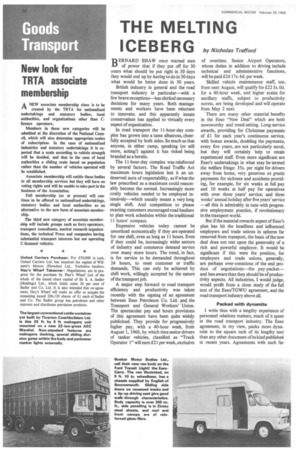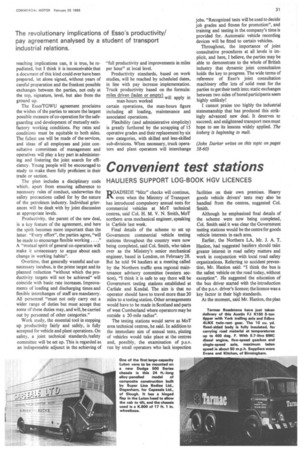THE MELTING ICEBERG
Page 32

Page 33

If you've noticed an error in this article please click here to report it so we can fix it.
by Nicholas Trafford
BERNARD SHAW once warned men of power that if they put off for 30 years what should be put right in 30 days they would end up by having to do in 30 days what would be better done in 30 years.
British industry in general and the road transport industry in particular—with a few brave exceptions—has shirked necessary decisions for many years. Both managements and workers have been reluctant to innovate; and this apparently innate conservatism has applied to virtually every aspect of organization.
In road transport the 11-hour-day complex has grown into a tame albatross, cheerfully accepted by both sides. So much so that anyone, in either camp, speaking (or still more, acting!) against it has risked being branded as a heretic.
The 11-hour-day complex was reinforced by several factors. The Road Traffic Act maximum hours legislation lent it an undeserved aura of respectability, as if what the law prescribed as a maximum could reasonably become the normal. Increasingly more costly vehicles needed to be employed intensively—which usually meant a very long single shift. And competition to please exacting customers encouraged road hauliers to plan work schedules within the traditional 11 hours' compass.
Expensive vehicles today cannot be amortized economically if they are operated for one shift, even as long as 11 hours. Even if they could be, increasingly wider sectors of industry and commerce demand service over many more hours. The trend, in fact, is for service to be demanded throughout 24 hours, to meet customer or traffic demands. This can only be achieved by shift work, willingly accepted by the nature of the transport job.
A major step forward to road transport efficiency and productivity was taken recently with the signing of an agreement between Esso Petroleum Co. Ltd. and the Transport and General Workers' Union. The spectacular pay and hours provisions of this agreement have been quite widely publicized. They provide for progressively higher pay, with a 40-hour week, from August 1, 1966, by which time senior drivers of tanker vehicles, classified as "Truck Operator 1" will earn £21 per week, exclusive of overtime. Senior Airport Operators, whose duties in addition to driving include technical and administrative functions, will be paid £24 17s. 6d. per week.
Skilled vehicle maintenance staff, too, from next August, will qualify for £22 5s. Od. for a 40-hour week, and higher scales for ancillary staffs, subject to productivity norms, are being developed and will operate from May 2 next.
There are many other material benefits in the Esso "New Deal" which are both newsworthy and trend-setting. Long-service awards, providing for Christmas payments of £1 for each year's continuous service, with bonus awards, doubling the payments, every five years, are not particularly novel, but they will certainly help to retain experienced staff. Even more significant are Esso's undertakings in what may be termed the welfare fringe: 35s. per night for drivers away from home, very generous ex gratia payments for sickness and accidents providing, for example, for six weeks at full pay and 10 weeks at half pay for operatives with over three years' service; and three weeks' annual holiday after five years' service —all this is admirably in tune with progressive employment practice, if revolutionary in the transport world.
But if the material rewards aspect of Esso's plan has hit the headlines and influenced employers and trade unions in spheres far removed from transport, the basis of the new deal does not rest upon the generosity of a rich and powerful employer. It would be significant if this were the position, for employers and trade unions, generally, are perhaps over-conscious of the end product of negotiations—the pay-packet— and less aware than they should be of productivity aspects. All industries, I would judge, would profit from a close study of the full text of the Esso/TGWU agreement, and the road transport industry above all.
Packed with dynamite
I write thus with a lengthy experience of personnel relations matters, much of it spent in the road transport industry. The Esso agreement, in my view, packs more dynamite to the square inch of its lengthy text than any other document of its kind published in recent years. Agreements with such far reaching implications can, it is true, be repudiated, but I think it is inconceivable that a document of this kind could ever have been prepared, let alone signed, without years of careful preparation and the frankest possible exchanges between the parties, not only at the top, signature, level, but also from the ground up.
The Esso/TGWIJ agreement proclaims the wishes of the parties to secure the largest possible measure of co-operation for the safeguarding and development of mutually satisfactory working conditions. Pay rates and conditions must be equitable to both sides. The fullest use will be made of the services, and ideas of all employees and joint consultative committees of management and operatives will play a key part in administering and fostering the joint search for efficiency. Young people will be encouraged to study to make them fully proficient in their trade or section.
The plan includes a disciplinary code which, apart from ensuring adherence to necessary rules of conduct, underwrites the safety precautions called for by the nature of the petroleum industry. Individual grievances will be dealt with by joint discussion at appropriate levels.
Productivity, the parent of the new deal, is a key feature of the agreement, and here the spirit becomes more important than the letter. "Every effort", the parties agree, "will be made to encourage flexible working ..
A "mutual spirit of general co-operation will make it unnecessary to argue about each change in working habits".
Overtime, that generally wasteful and unnecessary incubus, is the prime target and its planned reduction "without which the productivity targets will not be achieved" will coincide with basic rate increases. Improvements of loading and discharging times and flexible interchanges of staff are mandatory. All personnel "must not only carry out a wider range of duties but must accept that some of these duties may, and will, be carried out by personnel of other categories."
Work study, the essential tool in stepping up productivity fairly and safely, is fully accepted for vehicle and plant operations. On safety, a joint technical standards/safety committee will be set up. This is regarded as an indispensable adjunct in the achieving of "full productivity and improvements in miles per hour" at local level.
Productivity standards, based on work studies, will be reached by scheduled dates, in line with pay increase implementation. Truck productivity based on the formula: miles driven (laden or empty) will apply in man-hours worked certain operations, the man-hours figure including all loading, maintenance and associated operations.
Flexibility (and administrative simplicity) is greatly furthered by the scrapping of 15 operative grades and their replacement by six new categories, with skilled and less-skilled sub-divisions. When necessary, truck operators and plant operators will interchange jobs. "Recognized tests will be used to decide job grades and fitness for promotion", and training and testing in the company's time is provided for. Automatic vehicle recording devices will be fitted to certain vehicles.
Throughout, the importance of joint consultative procedures at all levels is implicit, and here, I believe, the parties may be able to demonstrate to the whole of British industry that dynamic joint consultation holds the key to progress. The wide terms of reference of Esso's joint consultation machinery offer lots of solid meat for the parties to get their teeth into; static exchanges between two sides of bored participants seem highly unlikely!
I cannot praise too highly the industrial statesmanship that has produced this strikingly advanced new deal. It deserves to succeed; and enlightened transport men must hope to see its lessons widely applied. The iceberg is beginning to melt.
(John Darker writes on this topic on pages 58-60)




























































































































